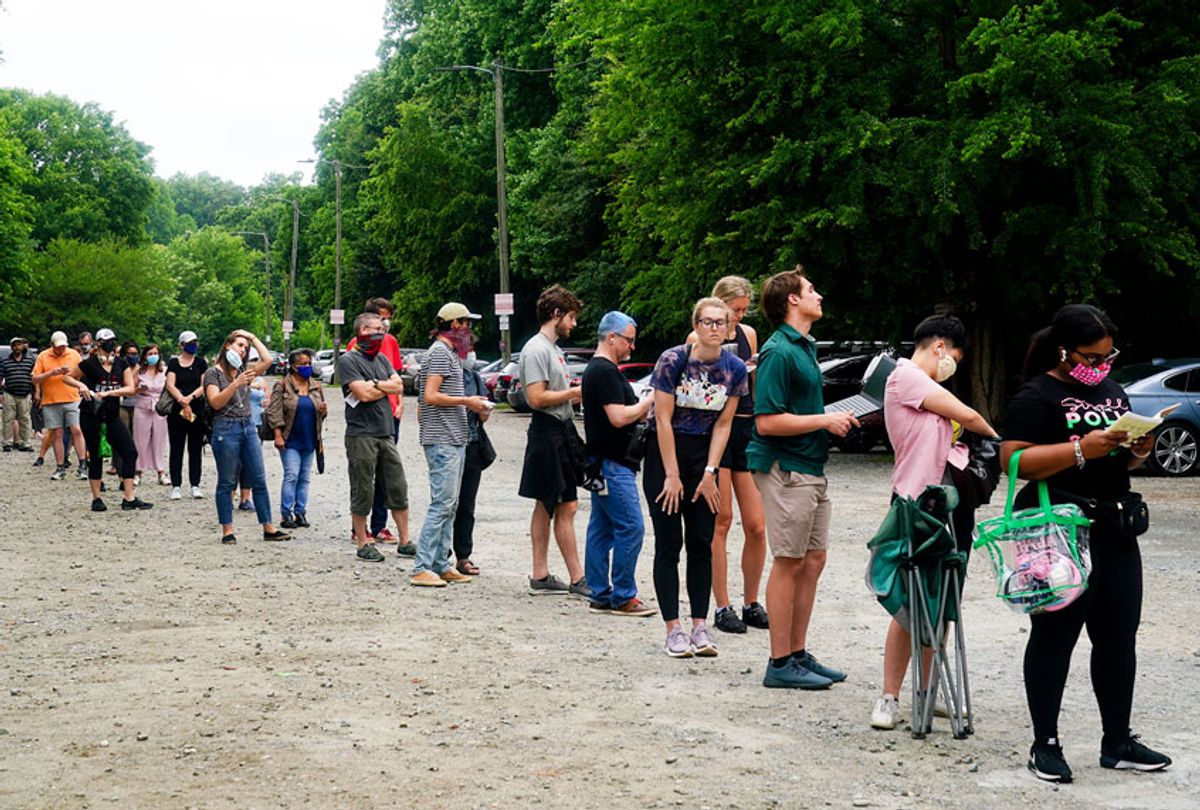Georgia Secretary of State Brad Raffensperger vowed to investigate the problems which caused hourslong lines yesterday at polling sites, but Democrats claimed it was he who should be investigated for allegations of disenfranchising voters in the state.
Raffensperger's office had already deemed the primary a "successful election" on Monday because of increased turnout after the state sent absentee ballot applications to all registered voters. But some in-person voters were forced to wait up to five hours Tuesday amid rising coronavirus infections in the state. Understaffing, a shortage of polling places and problems with new machines derailed Election Day in Georgia, which has systemically shuttered hundreds of polling places since the Supreme Court gutted the Voting Rights Act in 2013.
"Georgia closed 214 polling places after Supreme Court gutted Voting Rights Act," Mother Jones' Ari Berman tweeted. "There were 80 fewer polling places for June primary in metro Atlanta, where majority of black voters live."
The voting issues disproportionately affected the state's minority voters. Kristen Clarke, the head of the Lawyer's Committee for Civil Rights Under Law, told NBC News that about 75% of voters who reported problems were black. There were far fewer problems in white areas like Roswell, an Atlanta suburb, where voters reported being "out the door" within 20 minutes.
Clarke said the election was a "catastrophe," which bodes poorly for November.
"If we view the primary election as a dry run for November, then Georgia gets an F today," she said, adding that her group was flooded with calls from "voters who encountered barriers from polling sites that are not open on time, malfunctioning equipment, long lines with several hours' wait time, insufficient backup paper ballots and more."
Some Democrats said it was no surprise that "these scenes are specifically happening in Black communities — not white ones."
"This is BY DESIGN," Rep. Alexandria Ocasio-Cortez, D-N.Y., warned, "[and] it's their test run" for November.
"This is no accident," Rep. Pramila Jayapal, D-Wash., the co-chair of the Congressional Progressive Caucus, agreed. "Black and brown people have been kept out of our elections—100% on purpose and by design. We must end racist voter suppression efforts, restore, and expand voting rights, and build a democracy that ensures every voice is heard."
Raffensperger, a Republican, said there were "unacceptable" problems in "certain precincts" in DeKalb and Fulton counties.
"My office has opened an investigation to determine what these counties need to do to resolve these issues before November's election," he said in a statement. "Obviously, the first time a new voting system is used there is going to be a learning curve, and voting in a pandemic only increased these difficulties. But every other county faced these same issues and were significantly better prepared to respond so that voters had every opportunity to vote."
Georgia has been accused of voter suppression for years, particularly in minority areas. "Black voters bring survival kits to the polls — snacks, water, extra cell phone batteries," because they expect to brave excessively long lines, journalist Errin Haines wrote.
Voting problems in Fulton County in 2018 drew allegations of Republican voter suppression from Democrats. Then-Secretary of State Brian Kemp, a Republican, narrowly won the gubernatorial election that year against Democrat Stacey Abrams in a race she decried as "rigged."
Abrams on Tuesday said that Raffensperger "owns this disaster."
"From Jasper to Fulton to Coffee & Chatham, long lines, inoperable machines & under-resourced communities are being hurt," she tweeted. "He must stop finger-pointing and fix it."
"It's a disaster that was imminently preventable," she added. "We found ourselves in the mix of both incompetence and malfeasance."
DeKalb County CEO Michael Thurmond also blamed Tuesday's problems on Raffensperger.
"It is the secretary of state's responsibility to train, prepare and equip election staff throughout the state to ensure fair and equal access to the ballot box," he told NBC News. "Those Georgians who have been disenfranchised by the statewide chaos that has affected the voting system today in numerous DeKalb precincts and throughout the state of Georgia deserve answers."
Robb Pitts, the chairman of the Fulton County Board of Commissioners, told The Atlanta Journal-Constitution that "everything that could happen or go wrong has gone wrong."
Many of the problems stemmed from new voting machines the state purchased earlier this year over concerns that the existing system was not secure. Richard DeMillo, a cybersecurity professor at Georgia Tech, told NBC News that the new machines resulted in a "chaotic" bottlenecks and delays.
"Not a lot of guidance is being given to a lot of people," he said.
Eddie Perez, an election technology expert at the voting nonprofit OSET Institute, added that the new machines, a reduced number of polling places and shortages of paper ballots had created a "chain reaction," which resulted in hourslong waits.
The American Civil Liberties Union said it had warned about all of these issues ahead of the election but was ignored.
"The ACLU warned that insufficient resources were allocated for polling places, machines, in-person election staff and staff to process absentee ballots and that this would result in the disenfranchisement of voters in 2020," Andrea Young, the head of the ACLU of Georgia, said. "It gives us no pleasure to be proven right. Whether it is incompetence or intentional voter suppression, the result is the same — Georgians denied their rights as citizens in this democracy."
The state's Democratic Party said Raffensperger's office had failed to provide "adequate support and training" for the new system.
"We demand statewide action by the Secretary of State — the chief elections official in Georgia — to fix this problem immediately," the party said in a statement.
Some Democrats went further, calling on Raffensperger to resign.
"Mr. Raffensperger has failed at his most important responsibility," state Rep. Carolyn Bourdeaux said, "administering safe, fair, and efficient elections."



Shares